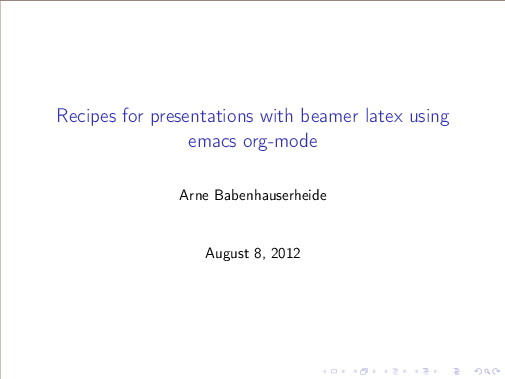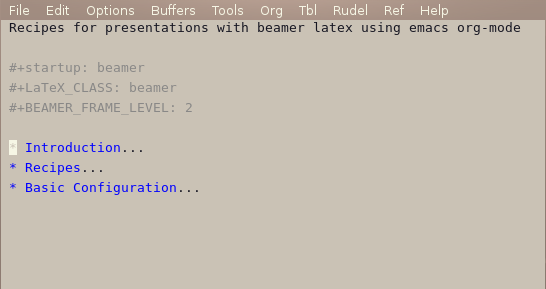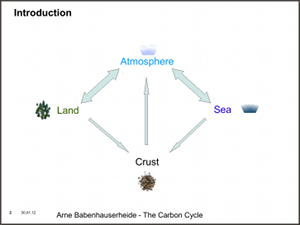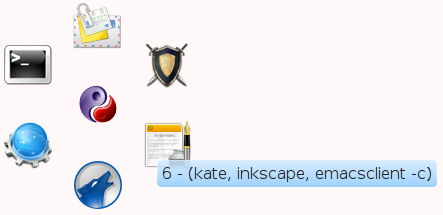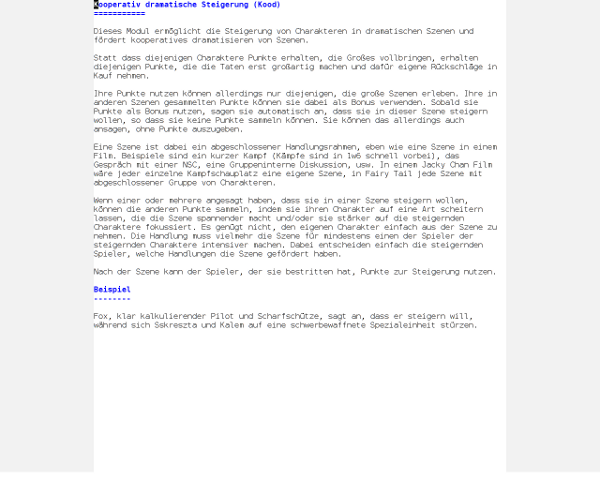English
Recipes for presentations with beamer latex using emacs org-mode
Mi, 08/08/2012 - 19:42 — DraketoI wrote some recipes for creating the kinds of slides I need with emacs org-mode export to beamer latex.
Update: Read ox-beamer to see how to adapt this to work with the new export engine in org-mode 0.8.
Below is an html export of the org-mode file. Naturally it does not look as impressive as the real slides, but it captures all the sources, so I think it has some value.
Note: To be able to use the simple block-creation commands, you need to add #+startup: beamer to the header of your file or explicitely activate org-beamer with M-x org-beamer-mode.
PS: I hereby allow use of these slides under any of the licenses used by worg and/or the emacs wiki.
- Login to post comments
- Weiterlesen
Der Kohlenstoffkreislauf | The carbon cycle (slides)
Mi, 07/18/2012 - 19:42 — Draketo I did a 10 minute talk about the basics of the carbon cycle. Since I think that it worked out quite well, I’m publishing the slides here under the GPL (=licensed free and copyleft).
I did a 10 minute talk about the basics of the carbon cycle. Since I think that it worked out quite well, I’m publishing the slides here under the GPL (=licensed free and copyleft). Ich habe einen 10 Minuten Vortrag zu den grundlegenden Mechanismen des Kohlenstoffkreislaufs gehalten. Da er meiner Meinung nach gut geworden ist, veröffentliche ich ihn hier unter der GPL (=frei und copyleft lizensiert).
Ich habe einen 10 Minuten Vortrag zu den grundlegenden Mechanismen des Kohlenstoffkreislaufs gehalten. Da er meiner Meinung nach gut geworden ist, veröffentliche ich ihn hier unter der GPL (=frei und copyleft lizensiert).
 If you want to use it, you can directly work on my source files:
If you want to use it, you can directly work on my source files: Falls ihr ihn nutzen wollt, könnt ihr direkt meine Quelldateien verwenden:
Falls ihr ihn nutzen wollt, könnt ihr direkt meine Quelldateien verwenden:
- Quelldatei | Source (odp), erstellt mit Libre Office
- Bilder | Images (zip)1
 Remember: GPL means: name previous authors, publish your source files and put what you create with it under the GPL, too.
Remember: GPL means: name previous authors, publish your source files and put what you create with it under the GPL, too. Denk daran: GPL heißt: Nennt die Vorautoren, veröffentlicht eure Quellen und stellt damit erstelltes auch unter die GPL.
Denk daran: GPL heißt: Nennt die Vorautoren, veröffentlicht eure Quellen und stellt damit erstelltes auch unter die GPL.
-
Die Bilder stammen aus Battle for Wesnoth ↩
- Login to post comments
Open Letter to Julia Hilden on her article about pay-per-use
Mi, 07/04/2012 - 16:16 — DraketoI just read your article on per use payments.
I think there are two serious flaws in per use payments:
(a) Good works of art need to last
As you stated correctly, I define myself partly through the media I "consume".
This does mean, that I want to have the assurance, that I can watch a great movie again a few years in the future.
Imagine this scenario:
- I found a really great book, read it and got entranced.
- It's 20 years later, now. and I want to read the book to my children.
- Login to post comments
- Weiterlesen
Background of Freenet Routing and the probes project (GSoC 2012)
Sa, 06/30/2012 - 20:40 — DraketoThe probes project is a google summer of code project of Steve Dougherty intended to optimize the network structure of freenet. Here I will give the background of his project very briefly:
The Small World Structure
- Login to post comments
- Weiterlesen
Minimal example for literate programming with noweb in emacs org-mode
Fr, 06/22/2012 - 11:33 — DraketoIf you want to use the literate programming features in emacs org-mode, you can try this minimal example to get started: Activate org-babel-tangle, then put this into the file noweb-test.org:
Minimal example for noweb in org-mode
* Assign
First we assign abc:
#+begin_src python :noweb-ref assign_abc
abc = "abc"
#+end_src
* Use
Then we use it in a function:
#+begin_src python :noweb tangle :tangle noweb-test.py
def x():
<<assign_abc>>
return abc
print(x())
#+end_src
- Login to post comments
- Weiterlesen
The ease of losing the spirit of your project by giving in to short-term convenience
Mo, 06/18/2012 - 17:02 — DraketoYesterday I said to my father
» Why does your whole cooperative have to meet for some minor legalese update which does not have an actual effect? Could you not just put into your statutes, that the elected leaders can take decisions which don’t affect the spirit of the statutes? «
He answered me
» That’s how dictatorships are started.«
With an Ermächtigungsbescheid.
I gulped a few times while I realized how easy it is to fall into the pitfalls of convenience - and lose the project in the process.
- Login to post comments
- Weiterlesen
Install and setup infocalypse on GNU/Linux (script)
Mo, 06/18/2012 - 16:39 — DraketoUpdate (2015-11-27): The script works again with newer Freenet versions.
Update 2024: Infocalypse is still recovering from Python 3 breakage. Most of it works again, but there may be rough edges left. Contributions to fix these are very welcome: hg.sr.ht/~arnebab/infocalypse or github.com/hyphanet/infocalypse.
Install and setup infocalypse on GNU/Linux:
Just download and run1 it via
wget http://draketo.de/files/setup_infocalypse_on_linux.sh_.txt
bash setup_infocalypse*
This script needs a running freenet node to work! → Install Freenet ←
In-Freenet-link: CHK@rtJd8ThxJ~usEFOaWAvwXbHuPC6L1zOFWtKxlhUPfR8,21XedKU8YbKPGsYWu9szjY7hChX852zmFAYuvyihOd0,AAMC--8/setup_infocalypse_on_linux.sh
The script allows you to get and setup the infocalypse extension with a few keystrokes to be able to instantly use the Mercurial DVCS for decentral, anonymous code-sharing over freenet.
« Real Life Infocalypse »
DVCS in the Darknet. The decentralized p2p code repository (using Infocalypse)
-
On systems based on Debian or Gentoo - including Ubuntu and many others - this script will install all needed software except for freenet itself. You will have to give your sudo password in the process. Since the script is just a text file with a set of commands, you can simply read it to make sure that it won’t do anything evil with those sudo rights. ↩
- Login to post comments
- Weiterlesen
The generation of cultural freedom
Do, 05/31/2012 - 21:15 — DraketoNew version of this article: draketo.de/politik/generation-of-cultural-freedom.html
I am part of a generation that experienced true cultural freedom—and experienced this freedom being destroyed.
We had access to the largest public library which ever existed and saw it burned down for lust for control.
I saw the Napster burn, I saw Gnutella burn, I saw edonkey burn, I saw Torrentsites burn, I saw one-click-hosters burn and now I see Youtube burn with blocked and deleted videos - even those from the artists themselves.
- Login to post comments
- Weiterlesen
El Kanban Org: parse org-mode todo-states to use org-tables as Kanban tables
So, 04/29/2012 - 14:39 — DraketoUpdate (2020): Kanban moved to sourcehut: https://hg.sr.ht/~arnebab/kanban.el
Update (2013-04-13): Kanban.el now lives in its own repository: on bitbucket and on a statically served http-repo (to be independent from unfree software).
Update (2013-04-10): Thanks to Han Duply, kanban links now work for entries from other files. And I uploaded kanban.el on marmalade.
Some time ago I learned about kanban, and the obvious next step was: “I want to have a kanban board from org-mode”. I searched for it, but did not find any. Not wanting to give up on the idea, I implemented my own :)
The result are two functions: kanban-todo and kanban-zero.
“Screenshot” :)
TODO DOING DONE Refactor in such a way that the let Presentation manage dumb sprites return all actions on every command: Make the UiState adhere the list of Turn the model into a pure state
- Login to post comments
- Weiterlesen
Exploring the probability of successfully retrieving a file in freenet, given different redundancies and chunk lifetimes
Fr, 03/16/2012 - 16:20 — DraketoTable of Contents
In this text I want to explore the behaviour of the degrading yet redundant anonymous file storage in Freenet. It only applies to files which were not subsequently retrieved.
Every time you retrieve a file, it gets healed which effectively resets its timer as far as these calculations here are concerned. Due to this, popular files can and do live for years in freenet.
- Login to post comments
- Weiterlesen
Write programs you can still hack when you feel dumb
So, 03/04/2012 - 22:55 — DraketoDebugging is twice as hard as writing the code in the first place. Therefore, if you write the code as cleverly as possible, you are, by definition, not smart enough to debug it. — Brian Kernighan
In the article Hyperfocus and balance, Arc Riley from PySoy talks about trying to get to the Hyperfocus state without endangering his health.
- Login to post comments
- Weiterlesen
Effortless password protected sharing of files via Freenet
Sa, 02/25/2012 - 06:14 — DraketoTL;DR: Inserting a file into Freenet using the key KSK@<password> creates an invisible, password protected file which is available over Freenet.
Often you want to exchange some content only with people who know a given password and make it accessible to everyone in your little group but invisible to the outside world.
Until yesterday I thought that problem slightly complex, because everyone in your group needs a given encryption program, and you need a way to share the file without exposing the fact that you are sharing it.
Then I learned two handy facts about Freenet:
Content is invisible to all but those with the key
<ArneBab> evanbd: If I insert a tiny file without telling anyone the key, can they get the content in some way?
<evanbd> ArneBab: No.You generate a key from a password by using a KSK-key
<toad_> dogon: KSK@<any string of text> -> generate an SSK private key from the hash of the text
<toad_> dogon: if you know the string, you can both insert and retrieve it
In other words:
Just inserting a file into Freenet using the key KSK@<password> creates an invisible, password protected file which is shared over Freenet.
- Login to post comments
- Weiterlesen
Patent law overrides copyright breaks ownership
Mi, 02/01/2012 - 17:24 — DraketoConcise and clear.
In patent law, copyright and property there are two pillars: protection and control.
Protection
- Property: No person shall take that from me.
- Copyright: No person shall have the same without my permission. A monopoly.
- Patent Law: No person shall create something similar without my permission. An even stronger monopoly.
Control
- Property: I decide what happens with this.
- Copyright: I decide what happens to everything which is the same. Takes another ones property. → a monopoly¹.
- Login to post comments
- Weiterlesen
“regarding B.S. like SOPA, PIPA, … freenet seems like a good idea after all!”
Fr, 01/20/2012 - 17:22 — Draketo“Some years ago, I had a look at freenet and wasn't really convinced, now I'm back - a lot has changed, it grew bigger and insanely fast (in freenet terms), like it a lot, maybe this time I'll keep it. Especially regarding B.S. like SOPA, PIPA and other internet-crippling movements, freenet seems like a good idea after all!”
— sparky in Sone
So, if you know freenet and it did not work out for you in the past, it might be time to give it another try: freenetproject.org
- Login to post comments
- Weiterlesen
def censor_the_net()
Do, 01/19/2012 - 21:05 — Draketodef censor_the_net(): "wealth vs. democracy via media-control" try: SOPA() # see Stop Online Piracy Act except Protest: # see sopastrike.com try: PIPA() # see PROTECT IP Act except Protest: # see weak links try: OPEN() # see red herring except Protest: try: ACTA() # see Anti-Counterfeiting_Trade_Agreement except Protest: # see resignation⁽¹⁾, court, vote anyway and advise against try: CISPA() # see Stop the Online Spying Bill except Protest: # see Dangers try: CETA() # See Comprehensive Economic and Trade Agreement except Protest: # see ePetition 50705 try: TTIP() # See Transatlantic Trade and Investment Partnership except Protest: # see TTIP-Protest erreicht Brüssel and Wie wir TTIP gestoppt haben try: TISA() # See Secret Trade in Services Agreement (TISA) except Protest: # see Unter Ausschluss der Öffentlichkeit try: JEFTA() # See Wie TTIP und wieder hinter verschlossenen Türen except Protest: # see deep concern und TTIP auf Japanisch verhindern und Ein Kniefall vor Japan? und JEFTA Leaks try: Article11And13() # See Die Zensurmaschinen und das Leistungsschutzrecht kommen in die Zielgerade der EU-Gesetzgebung except Protest: # see Stop the censorship-machinery! Save the Internet! try: FreiwilligeRasterung() # See Mit Hashabgleich und TPM except Protest: # see nur für gute Menschen and „eine neue Zensursula-Kampagne“ and „Wenn Privatsphäre kriminalisiert wird, werden nur Kriminelle noch Privatsphäre haben.“ try: TERREG() # See TERREG-Verordnung except Protest: # see discord.savetheinternet and TERREG-Sharepics and Uploadfilter auf Steroiden and new online censorship powers try: Chatkontrolle() # See Nachrichtendurchleuchtung except Protest: # see KI Anzeige wegen Sexting and Wiretapping Children and Deutscher Anwaltsverein and Strategic autonomy in danger and Kinderschutzbund gegen anlasslose Scans verschlüsselter Nachrichten and droht unsere Strafverfolgung…lahmzulegen and das verdächtige Bild try: CETA_in_Gruen() # See Ratifizierung im Galopp except Protest: # see Ceta bleibt falsch and Zu wenig staatliche Kontrolle try: Danish_Chatkontrolle() # See Schattentreffen and Anwaltsverein warnt except Protest: # see Warum ist Chatkontrolle so gefährlich für uns alle? and Apothekenumschau and Forschende beklagen die Ignoranz try: Mandate_Voluntary_Control() # See Perfides Täuschungsmanöver except Protest: # See The public is being played for fools and Fight Chat Control Timeline if destroy_free_speech_and_computers(): # (english video) from __future__ import plutocracy
while wealth_breeds_wealth and wealth_gives_power: # (german text and english video) # see wealth vs. democracy via media-control (german) censor_the_net()
- Login to post comments
- Weiterlesen
Freenet anonymity: Best case and Worst case
So, 11/27/2011 - 12:00 — DraketoAs the i2p people say, anynomity is no boolean. Freenet allows you to take it a good deal further than i2p or tor, though. If you do it right.
Worst case: If all of Apple would want to find you, because you declared that you would post the videos of the new iDing - and already sent them your videos as teaser before starting to upload them from an Apple computer (and that just after they lost their beloved dictator), you might be in problems if you use Opennet. You are about as safe as with tor or i2p.
Best case: If a local politician would want to find you, after you uploaded proof that he takes bribes, and you uploaded the files to a new safe key (SSK) and used Freenet in Darknet-mode with connections only to friends who would rather die than let someone take over their computer, there’s no way in hell, you’d get found due to Freenet (the file data could betray you, or they could find you by other means, but Freenet won’t be your weak spot).
- Login to post comments
- Weiterlesen
Shackle-Feats: The poisoned Apple
Di, 10/18/2011 - 20:37 — DraketoMaking an ability mandatory which forces you to wear shackles takes your Freedom away
Making an ability mandatory which forces you to wear shackles takes your Freedom away
This is an email I sent as listener comment to Free as in Freedom.
Hi Bradley, Hi Karen,
I am currently listening to your Steve Jobs show (yes, late, but time is scarce these days).
And I side with Karen (though I use KDE):
Steve Jobs managed to make a user interface which feels very natural. And that is no problem in itself. Apple solved a problem: User interfaces are hard to use for people who don’t have computer experience and who don’t have time to learn using computers right.
But they then used that solution to lure people into traps they set up to get our money and our freedom.
- Login to post comments
- Weiterlesen
Richard M. Stallman stands for Free Software
Mi, 09/14/2011 - 05:58 — Draketo→ a comment to 10 Hackers Who Made History by Gizmodo.
As DDevine says, Richard Stallman is no proponent of Open Source, but of Free Software. Open Source was forked from the Free Software movement to the great displeasure of Stallman.
He really does not like the term Open Source, because that implies that it is only about being able to read the sources.
Different from that, Free Software is about the freedom to be in control of the programs one uses, and to change them.
More exactly it defines 4 Freedoms:
pyRad is now in Gentoo portage! *happy*
Mo, 07/18/2011 - 08:12 — DraketoMy wheel type command interface pyRad just got included in the official Gentoo portage-tree!
So now you can install it in Gentoo with a simple emerge kde-misc/pyrad.
- Login to post comments
- Weiterlesen
Spread Freenet: A call for action
Mi, 06/15/2011 - 01:09 — Draketo
“Daddy, where were you, when they took the freedom of the press away from the internet?” — Mike Godwin, Electronic Frontier Foundation
Reposted from Freetalk, the distributed pseudonymous forum in Freenet.
For all those among you, who use twitter, identi.ca[^identica], and/or other social networks this is a call to action.
Go to your social networking accounts and post about freenet. Tell us in 140 letters why freenet is your tool of choice, and remember to use the #freenet hashtag, so we can resend your posts!
I use freenet because we might soon need it as safe harbour to coordinate the fight against censorship → freenetproject.org
The broader story is the emerging concept of a right to freely exchange arbitrary data — Toad (former lead developer of freenet)
- Login to post comments
- Weiterlesen
emacs wanderlust.el setup for reading kmail maildir
So, 05/15/2011 - 21:04 — DraketoThis is my wanderlust.el file to read kmail maildirs. You need to define every folder you want to read.
;; mode:-*-emacs-lisp-*-
;; wanderlust
(setq
elmo-maildir-folder-path "~/.kde/share/apps/kmail/mail"
;; where i store my mail
wl-stay-folder-window t ;; show the folder pane (left)
wl-folder-window-width 25 ;; toggle on/off with 'i'
wl-smtp-posting-server "smtp.web.de" ;; put the smtp server here
wl-local-domain "draketo.de" ;; put something here...
wl-message-id-domain "web.de" ;; ...
- Login to post comments
- Weiterlesen
7,26€ through Flattr last month
Di, 05/10/2011 - 14:42 — DraketoLast month I earned 7,26€ through my Flattr account (Flattr is a voluntary payment service where people can make micropayments if they like something - after enjoying it). The flattrs came in through just 4 items:
- The incremental Mercurial guide, “Learning Mercurial in Workflows”.
- The Freenet promotion “I hope French Filesharers turn to Freenet” (written in reply to news about millions of hadopi letters).
- The Esperanto version of my free one page pen-and-paper roleplaying game: The “Slipoj-Rolludo”.
- And my free software song “Infinite Hands”.
Thank you very much for your flattrs, dear supporters1! Thanks to you I could pay most of my server cost this month via the money from flattr - and that’s great!2
-
This month I was flattred by eileentso, esocom, Elleo and a user who wanted to stay anonymous. Thank you again! ↩
-
And being able to pay the server might become much more important in the following months, as soon as my wife’s parental money runs out and I need to finance the family from a (50%) PhD-salary for a year… ↩
- Login to post comments
Filk the gist
Mo, 05/09/2011 - 20:59 — DraketoA parody on March of Cambreadth (mp3) by Heather Alexander aka Alexander James Adams, the Fairy Tale Minstrel, written on the filk-de list to say “damn, we are filkers! We don’t quabble about politics — we sing about them!”
Filk the gist
Keyboards klick, Cellphones ring,
Shining laptop’s hackers sing,
Newsfeeds burn with polished prose,
Show us where we find our foes,
Midnight flame with congressmen,
Fight the trolls to keep us sane,
Sound the horn and call the cry,
How many of us can spot their lie?
Fuck the orders you get told,
Make their shallow hearts get cold,
Fight until you die or drop,
A force like ours is hard to stop,
Close your mind to stress and pain,
Write till you’re no longer sane,
Let not one wrong word pass by,
How many of us can spot their lie?
- Login to post comments
- Weiterlesen
A roleplaying easter holiday 2011
Di, 04/26/2011 - 10:06 — DraketoWe played Exalted sunday morning, slaying a second circle demon before nightfall, and Dresden Files (FATE) till 2 o'clock in the night.
- Login to post comments
- Weiterlesen
Learning Mercurial in Workflows
Do, 03/17/2011 - 09:42 — DraketoThe official workflow guide for Mercurial, mirrored from mercurial-scm.org/guide. License: GPLv2 or later.
It delves into nonlinear history and merging right from the beginning and uses only features you get without activating extensions. Due to this it offers efficient and safe workflows without danger of losing already committed work.
- Login to post comments
- Weiterlesen
Infocalypse - Make your code survive the information apocalypse
Di, 03/15/2011 - 11:21 — DraketoAnonymous DVCS in the Darknet.
Update 2024: Infocalypse is still recovering from Python 3 breakage. Most of it works again, but there may be rough edges left. Contributions to fix these are very welcome: hg.sr.ht/~arnebab/infocalypse or github.com/hyphanet/infocalypse.
This is a mirror of the documentation of the infocalypse extension for Mercurial written by djk - published here with his permission. It is licensed solely under the GPLv2 or later. The text is long. For concise information, use the second Link above (Freenet Development over Freenet).
Introduction
The Infocalypse 2.0 hg extension is an extension for Mercurial that allows you to create, publish and maintain incrementally updateable repositories in Freenet.
Your code is then hosted decentrally and anonymously, making it just as censorship-resistant as all other content in Freenet.
It works better than the other DVCS currently available for Freenet.
Most of the information you will find in this document can also be found in the extension's online help. i.e.:
hg help infocalypse
- Login to post comments
- Weiterlesen
fonättikl inglisch
So, 03/13/2011 - 22:04 — DraketoThe slaves we freed,
This is what I read,
And yesterday I read,
That they all fled.
PS: The title is “phonetical english”, written in a way, that germans can just read it aloud to speak it correctly.
- Login to post comments
Simple Emacs DarkRoom
Sa, 01/22/2011 - 03:19 — DraketoI just realized that I let myself be distracted by all kinds of not-so-useful stuff instead of finally getting to type the text I already wanted to transcribe from stenografic at the beginning of … last week.
Screenshot!
Let’s take a break for a screenshot of the final version, because that’s what we really want to gain from this article: a distraction-free screenshot as distraction from the text :)
As you can see, the distractions are removed — the screenshot is completely full screen and only the text is left. If you switch to the minibuffer (i.e. via M-x), the status bar (modeline) is shown.
A vision for a social Freenet with WoT, FreeTalk and Sone
Di, 01/04/2011 - 09:02 — DraketoI let my thought wander a bit around the question how a social Freenet (2.0 ;) ) could look from the view of a newcomer.
I imagine myself installing freenet. The first thing to come up after starting it is the node page. (italic Text in brackets is a comment. The links need a Freenet running on 127.0.0.1 to work)
“Welcome to Freenet, where no one can tell you’re reading”
“Freenet tries hard to project your privacy. Therefore we created a pseudonymous ID for you. Its name is Gandi Schmidt.
- Login to post comments
- Weiterlesen
Volkoi
So, 12/19/2010 - 22:04 — DraketoThere’s music in their stamping,
in their shouting to above,
There’s rhythm in their live,
in fight and death and love,
(There's rhythm in their stance,
in strike and blow and bluff,)
Where nobler people seek the truth
and never find their hearts,
A Volkoi’s always on his toes,
when the music starts.
— Eschrandar, Nayan War Engine, Mechanical Dreams (sadly only the store is left of this great game…)
- Login to post comments
